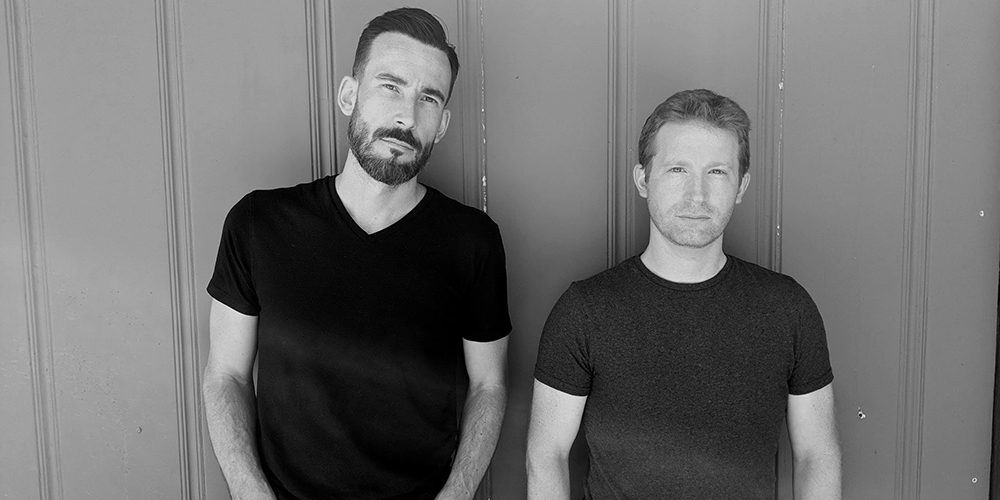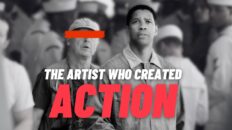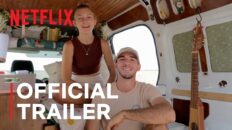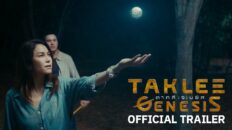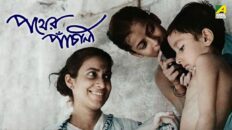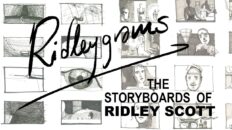Summer of 84 is the new horror film from the director collective known as RKSS–François Simard, Anouk Whissell, and Yoann-Karl Whissell. As far as follow-up films go, Summer of 84 is a significant departure from the frantic and gory fun of 2015’s Turbo Kid. So what did it take for RKSS’s attention to turn to a film that is a quiet, slow-burn of a coming-of-age story steeped in an 80s retro horror aesthetic? Rise Up Daily had the opportunity to speak to the screenwriters responsible for this beautifully executed indie film, Stephen J. Smith and Matt Leslie. We talk about how they got into the business, what it was like working with three directors on one movie, and some of the deeper themes that will grip the audience when they see Summer of 84 which is now on VOD and physical formats. There are spoilers for the film in the second half of the discussion. Reader’s discretion is advised.
RUD: Tell me a little bit about you two and how you got into the screenwriting business.
Stephen: Sure. I’m from Milwaukee. I actually still live in the area just outside of Milwaukee, in a city called Waukesha. I started with fiction writing as an undergrad at the University of Wisconsin. I started out wanting to go into animation, but then I was kind of talked into being a writer by some college professors who said I had a really visual style due to my art background. I changed majors, graduated, and then moved to LA to go to UCLA for a year for their extension screenwriting program. I lived there for 8 years, working as a copywriter doing marketing for some of the studios like MGM and New Line. During that time I met Matt at a writer’s group at a producer’s house in Silverlake. We joined at the same time, and we liked each other’s notes and each other’s stories and feedback. After that, we both independently did this thing called the Writer’s Boot Camp in Santa Monica, which is this two-year writing program. We were randomly in each other’s class, and I was like, “Oh! It’s you!” Again, we liked each other’s notes there, and we kept bumping into each other around town at events like the Creative Screenwriting Expo and a few seminars. I ended up moving back to Wisconsin for work, and once I got back here, I found this contest which is now defunct that’s called the Script-a-thon—write a script in thirty days or less. So I called Matt because we had always talked about writing something at some point, and I thought this was low commitment and we could give it a shot. We came up with a really quick story and blasted it out in 28 days. It ended up winning the whole contest. There was like 1,300 entries-ish. It wasn’t huge, but it was enough for us to think we should keep doing this. And we’ve been doing that for 7 years now. That’s how we met. Now, Matt can give his origin story [chuckles].
Matt: The quick version is that I wasn’t in the business at all until I was about 31. Prior to that I had a website design company, but I didn’t really know what I wanted to do with my life. I had been screenwriting on the side, and that year I ended up dissolving my company and focusing full-time on writing. It was during that time that I met Steve. We wrote the script he mentioned for the Script-a-thon contest, won the grand prize, and it got us a meeting with APA. We were obviously really excited—we were like, “We made it! We’re screenwriters now!” What ended up happening was this guy who was a Coordinator at APA said he would “hip-pocket” us. Hip-pocketing basically means “I don’t officially rep you, but I act like I rep you.” Coordinators can’t represent anyone because they’re not yet agents, but it’s pretty standard that as they’re working toward becoming an agent, they begin to build a roster of young, up-and-coming writers. Anyway, this was a big break for us, but then he called us right before we were gonna start working together and said, “Sooo, I just got a job at a studio and so I can’t work with you guys anymore. But, I’m gonna hand you off to another guy here who’s also a coordinator. He wasn’t a comedy guy, so he wasn’t interested in the script we wrote. He just wasn’t passionate about it. At that point, Steve and I were like, “What the hell are we gonna do now? How do we break in?” It was our first taste of just how challenging it is to get into this business. We started to see all the walls put up throughout Hollywood. So we started strategizing. At the time, I had a friend who worked for a producer named Matt Alvarez, and I said to my friend, “Get me a meeting with Matt and tell him I’ll work for him for free. I’ll be his assistant, I don’t care, I just want to get into the business.” The long and short of it is I got that job working for Matt, and I ended up doing so for about 3 years. I started as his assistant and worked my way up to his development executive. Toward the end of my time with Matt, we ended up working on Straight Outta Compton, and I did a ton of really heavy development on that script. I was working with Matt, as well as Scott Bernstein (the EVP of Production from Universal Pictures), Dr. Dre, F. Gary Gray, Ice Cube and all those guys in the movie. During that process, I worked really closely with Bernstein who ended up leaving Universal right after Straight Outta Compton wrapped to produce movies on his own. At that point, I went to work for him and stayed there for three years. I eventually had to leave Bernstein so I could produce Summer of 84. So that’s basically my background as a development executive for those two producers. My origin story.
RUD: How did the idea for Summer of 84 come into existence and what were your influences when writing it?
Matt: I actually don’t remember whose idea it was originally.
Stephen: I think what it was originally was that you said, “I love movies from the 80s like The Burbs and Fright Night and Stand by Me and I would love to write a movie like that someday.” And I said, “Yeah, I like those too, so how do we do one of those, but for audiences today?” So we started digging into some of the ideas about when you were growing up, there was always the creepy house down the street, the weird neighbor… I’m pretty sure that’s how it started.
Matt: Yeah, I think that’s probably it. All those movies are awesome—they’re movies that I love, and yeah, I remember we were like, “If we’re gonna do this, how do we do something new and different?” This was before Stranger Things had come out. We were conceiving of this in 2014 and we ended up writing it that year into early 2015. There was no IT, there was no Stranger Things. We were like, “We are really doing something cool and fresh here.” The cool and fresh bit to us was that the kids were gonna swear a ton like we used to—we’re gonna make it R-rated, which we hadn’t really seen. Plus, we’re gonna make the ending really dark and grounded so it feels realistic. Because if a kid thought his neighbor was a serial killer, and he was right, it probably wouldn’t end well for him. We had never seen that in this genre. We had seen the Disturbia ending, where the main kid wins in the end, but we hadn’t seen the realistic ending. So that was kind of the DNA we started with.
RUD: What was it like working with RKSS in translating your story to the screen?
Matt: Well, when I was working for Scott Bernstein as his development guy, I met with RKSS and I kind of took the opportunity to pitch them Summer of 84. We had just finished the treatment on the story, so I pitched it in the room and they loved it. They were like, “Send us the treatment.” They read the treatment, loved it, and then told us to write the script and send it to them. We spent the next couple of months writing the script, sent it to them, and they were in. They said they loved it, they didn’t want to change a word. They were very enthusiastic and they totally got the concept from the get-go. The notes we did get all came from Gunpowder & Sky, the financier, who really felt like it was running a little bit long. At the time, the script was 112 pages and we ended up cutting it down to 104 pages with the excellent notes they gave us.
RKSS, you know it’s three directors, and I think a lot of people are like, “How the hell does that work?” Obviously, it’s not without its challenges. But what’s great about RKSS is it’s a husband (Francois) and wife (Anouk) and then the wife’s brother (Yoann). They had known each other since they were kids, so they basically operate like they have one brain. They all have the same ideas and thoughts. It’s kind of crazy. It’s like a hive mind. They don’t have disagreements or, if they do, they don’t make it known outside of their bubble. I don’t think I ever saw them argue. They’re a united front. For us, it gave us confidence.
Stephen: How they operate is that Yoann is kind of the most outspoken one and he deals exclusively with the actors and the talent. He’s giving notes and running over to them between takes and talking to them and helping them figure things out. Frank is the guy who sits behind the camera with the DP, he’s the guy who calls action. He’s also the guy, in the morning, who shows up with the storyboards for how they want to block everything out and he’s figuring out how to execute that at the location. Anouk stands in video village and oversees the whole thing. She’s kind of like quality control. They come together to watch a take, they all talk about it and come up with their collective notes, and then they all break off again to go make adjustments for the next take. It’s really interesting to watch that dynamic.
RUD: There has been a lot of retro 80s horror of late including Summer of 84. Why do you think there has been such a surge of nostalgic 80s elements in horror, especially?
Matt: Steve, you got a theory?
Stephen: Yeah, I got a theory. You know, it’s a scary world out there right now and I think people are nostalgic for a more innocent time, a safer time. I think it’s that, paired with the age of filmmakers now. A lot of us grew up in that era and were inspired by the movies of that era, and as we’re now reaching the stage where we can get our own projects greenlit, those influences are all coming from that place. We’re going back to that wistfulness and tapping back into that age of innocence that we felt. That’s my theory for it.
RUD: Makes sense. So that being said, with all of the nostalgia going on, how did you two seek to transcend simple nostalgia in this film, because I think you do a superb job of it. Many of the reviews have mentioned that fact as well.
Matt: I’ll throw in one of my thoughts about it. For us, it was about theme. I was always fascinated with what is going on behind closed doors. Do you ever really know your neighbors? When I was a kid, my school bus would drop me off at the same bus stop every day and I would have to walk up the same street every day after school. I would see, typically, the same people outside of their homes, but then with other homes, I don’t think I ever saw the person who lived there. And my mind would just go wild with that mystery—how come I never see the person who lives in that house? Especially when they only live like ten houses down from me! Maybe they were a CIA spy, or maybe they were a serial killer and, of course, none of that was probably true, but when you’re young and living in a sleepy community, your mind just kind of goes crazy. At least mine did. And that’s why I think movies like Fright Night and The Burbs always resonated so much with me—and The Goonies too. It’s about something really extraordinary happening in an ordinary place. So with this, we really wanted to tap into that idea. You may think you know somebody, you may think you really know your neighbor, but behind closed doors, they’re different. Woody’s mom is an alcoholic, but you don’t know that. On the outside, she’s just a workaholic mom who’s trying to stay afloat. Nikki’s parents are getting divorced and that rumor is just starting to trickle out into the community because people have learned that her father’s not living at home anymore. On the surface, she seems like she has everything going for her, but in reality she’s really just feeling incredibly lonely. Eats’ stepfather is mentally and physically abusive—he’s living in a shattered and dysfunctional home. That’s why he acts out and behaves the way he does. We just really liked playing with that theme because it’s everywhere. It’s something we can all relate to.
Stephen: I was going to say something similar. For us, the story we were telling and the themes we wanted to deal with felt at home in that era. I think the story would be much different if you put it in any other era. Whereas like Stranger Things is great for what they do, but you could definitely tell a 90s version of Stranger Things and it would basically be the same. Because really they’re just using a lot of surface-level nostalgia stuff. “They’re all dressed up as Ghostbusters going to school!” It’s like, okay, but what we wanted to do was go deeper and explore themes through the lens of nostalgia. That loss of the age of innocence for the boys and also for the world around them, and the concept of not knowing who your neighbors really are. I guess the way I would put it would be, if IT and Stranger Things are kind of the light side of nostalgia—like “Oh, I remember that toy!”—we wanted to deal with the darker side of nostalgia, the stuff you didn’t see going on. What was stirring beneath the surface that’s become more evident in the eras since then.
Matt: Well said. I think on the macrocosmic level, it’s the loss of innocence of society, and on the microcosmic level, it’s Davey’s loss of innocence. That’s definitely a parallel we always had at the top of our mind as we were writing it.
RUD: With Summer of 84, there is this brilliant voice over at the beginning and the end of the film that creates this parallelism. What starts off at the beginning as a call to adventure and wiles of youth has a sinister and bleak edge when recalled at the end…
Matt: I don’t think anyone has ever noticed this, but when you start the movie with Davey on his newspaper route, his voiceover dialogue is spoken in one order, and then at the very end of the movie when he’s back on his paper route, the order of that same voiceover dialogue is completely flipped. Same dialogue, reverse order. People think it’s exactly the same, but it’s not. And because of that reversed order, combined with everything Davey’s gone through in the movie, those words have such a different and more profound meaning at the end compared to the beginning. It’s just one of those subtle things. It was a really tricky—it took us a long time to crack that dialogue, but it was so worth it.
RUD: It definitely shows and it really does frame the film superbly. I think one of the ideas that you two capture in the film is this idea of decaying suburban landscapes and how it begins to be exposed by the end of the film. Was that your central theme or more of a side theme once you started to write it?
Stephen: I think it was definitely in our minds when we set out to write it. I mean, we figured out how we wanted it to end really quickly, and so we wanted that darker theme to come through and knew that a big chunk of that would be watching this suburb basically wake up to the the lack of safety. Obviously, it’s reflected in the breaking down of the tree house at the end and the mom foreclosing on her house. I think the decay of that area was definitely on our minds throughout. You can see it right in the opening shot, when Davey’s riding up the street, there are people everywhere on the road, washing their car, and they’re waving and saying hi. Then at the end, when he’s making the exact same ride up the street, you don’t see anybody outside. They’re all behind locked doors now and fear has taken hold. We wanted that dichotomy between the shots to reflect that this neighborhood has become a darker, more serious place. Everyone is now questioning what is going on in the house next door.
Matt: Yeah, I think so too. It’s not a political movie by any means, but there is also this tendency for us, as a society, to look back on a specific period of time and think it was this better time. I know a lot of people who are big President Reagan fans who look at that era like it was this beautiful, boom time, but I think, beneath the surface, the cracks in the dynasty, so to speak, were already beginning to show. That underlying commentary in the film wasn’t something that was overtly planned, but as we were writing it, it just sort of became apparent that that DNA was in there. That said, the Cold War was something we loved tapping into. Davey’s father Randall has that line, he says, “The Cold War’s never gonna end. Your future is doomed, Davey.” That’s obviously us pointing at the fact that here we are in 2018, right back in this weird cold war again. As they say, history doesn’t repeat itself, but it does rhyme. A lot of the social and economic issues of that era are relevant again, which really goes a long way toward making a film set back in the 80s feel relevant to audiences today. That was definitely something we consciously stitched into the DNA of the script. But yeah, the 80s made for a fascinating backdrop.
RUD: When Dale’s throat is cut by the killer at the film’s climax, what made you two write that scene into the story considering the history of the taboo of killing kids in horror films?
Stephen: Well, Matt’s a really sadistic guy, so… [chuckles] No, I guess, when we were setting out to write it, like we said earlier, we wanted it to be more grounded and gritty. If you were 15-years-old and you figured out that your neighbor was a serial killer who had been operating for over a decade, that is not going to end well for you. And having Davey be the driving force in the film—it’s his determination and curiosity that gets them all into this situation. Right from the get-go we thought, what would be the most emotionally crippling ending for him? It felt like dying wouldn’t be that, it would be the loss of his best buddy. So we decided to go that route for that reason, because we knew it would set us apart in the genre, but also it would be such a powerful payoff through this whole movie of everyone saying, “Davey, let it go,” and he doesn’t let it go and he gets his friend killed.
Matt: Yeah, curiosity killed the cat’s best friend.
[both begin laughing again]
Matt: Yeah, I think that’s exactly right. It was one of the only things we hadn’t seen done in this genre, and we thought it would be really unique. In terms of the kid-killing thing, you know that kind of stuff happens in real life, as sad as that is to say. The really crazy thing too is when we wrote this, again, it was pre-Stranger Things, pre-IT, and since then it’s like kid-killing has become totally normal. Georgie gets his arm bit off at the beginning of IT and gets sucked down a drain. There was that movie, It Comes At Night, where a kid gets shot with a rifle. That one was really traumatic. I was like, “Oh my god, what just happened?!” I think those films kind of paved the way for ours a bit, because ours took more time to get made. We had written it prior to that stuff, but then that stuff came out and made it a little bit more palatable for our movie to take that risk. I know that the studio, Gunpowder & Sky, was nervous—so much so that they wanted us to shoot an alternate version where Woody dies, but not the way he dies in the film now. A much less graphic version. Fortunately or unfortunately, depending on whose perspective you’re coming from, we didn’t have time to shoot that alternate version. The ending you see in the film is the only version we had. They greenlit the script knowing that was the ending so they were really always on board for that, and I’ve gotta give them credit. They put their money on the line and let us make the movie we really wanted to make.
Stephen: Tacking onto that idea, Rich Sommer played that moment so well. The description of it in the script is that you see Mackey getting almost a sexual thrill out of it. Rich played that. Rich’s face and the way his body is in that moment, it’s so disturbing that he could take it to that place so well. He just nailed it.
Matt: The ending of our movie just really rests on the shoulders of Rich Sommer’s performance completely and, man, what an actor he is. When we were watching him film that scene where he is yelling in Davey’s face, right before he takes off in his cop car, we were all just like, “Holy shit, man! That was amazing!” He brought it to life better than we had even imagined.
Stephen: She probably won’t like that we mentioned this, but our Davey actor, Graham Verchere, his mom was there when we were filming that scene, and she was literally standing in video village crying as she was watching. It was so intense. That was something, watching that. I think we knew then that it was all going to work.
RUD: I thought the ending monologue from Mackey was phenomenal and a breath of fresh air when it came to the tidy endings of most horror films. What made you two go more in the direction of dread and a lack of resolution for Davey? Did that feed into the theme or something else? Or was it just Matt being sadistic again?
Matt: Let me take that one because I single-handedly wrote that whole monologue. Ha… Nah, just kidding, that was actually all Steve. Truthfully, he wrote the first draft of that whole sequence of the script, and I remember we didn’t even rewrite much of it because it was already so solid.
Stephen: Going back to what you said about theme, once we finished filming and looked back on it and were like, “Ohhh, that worked really well for that.” However, what it was more than that for me was asking what was the worst thing for Davey. It wasn’t dying. It was the idea of this kid’s life just being destroyed by this guy. He’s going to spend every second of every day wondering if Mackey’s gonna come back. For Mackey’s part of it, he’s been operating under the radar as a serial killer for over ten years. He’s kind of bored and feeling like he’s smarter than everyone else, so he writes this letter and then just kind of watches the cops still unable to catch him. And now there’s this bastard little kid who comes along and he just won’t leave him alone. And at the end, Mackey’s life is just as destroyed as Davey’s, at least in the short term. Now he’s going to be on the run, he’s got to reestablish himself somewhere, and he’s got to build back this reputation for himself. So it really was this crucial, shared moment when the two of them are going to walk away from this with shattered lives. Coming off that moment then, that threat of Mackey coming back just felt so powerful to us, for both characters. It all kind of came from that.
RUD: Tell us about what is on the horizon for both of you. Do either of you have aspirations for trying your hand at directing or is writing where you choose to stay?
Matt: Steve and I, one of the things we have learned is that in this town you’ve got to have a lot of irons in the fire because odds are, most of those irons are never going to heat up. It’s a sad reality, but it just is what it is. So we’re trying to be as prolific as possible. We’re writing, we’re producing, and we definitely do have plans to direct. We have a project right now being written by an up-and-coming writer along with us and we plan to direct that. It’s an indie mystery-suspense-horror movie and it’s gonna freak people out. Other than that, we’ve got a digital series at Skybound, the guys who did The Walking Dead. It’s based on the videogame, Oxenfree, which is a super cool indie game. Basically our digital series riffs on a foundational subplot of that game. It’s a sci-fi-suspense-mystery series that we’re excited about. And then just a bunch of other random stuff that I won’t bore everyone with. Steve, did I miss anything noteworthy? I guess we could talk about The Harrowing…?
Stephen: Yeah, we have a script we wrote right after Summer of 84, maybe within the same six month period, that’s a supernatural thriller called The Harrowing. It’s like a modern day Rosemary’s Baby with this really gut-punch twist ending on it. That one’s been optioned by a company called Cinelou and it seems like it’s starting to get some real momentum, so we’re really hoping that will go into production next year.
Matt: Yeah, I think that’s our best script to date. It’s the concept that’s most exciting to me personally, and I suspect has the broadest appeal. We’re excited about that one, but we shall see! Like everything in this town, it’s a waiting game. You just gotta keep your fingers and toes crossed.


